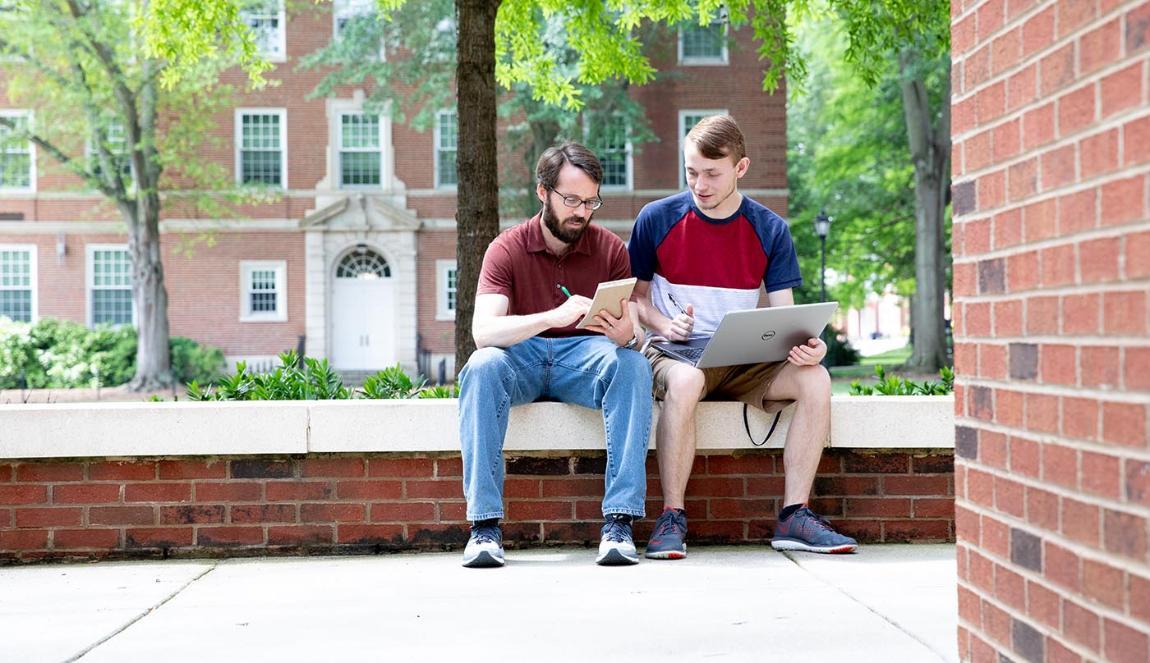When Matthew Bowman ’20 explains to people that his science research project doesn’t involve test tubes or complex equations, he often gets a perplexed reaction.
That’s because Bowman is researching science education in hopes of improving teacher practices. His summer PRISM project with Dr. Benjamin Campbell focuses on qualitative research that straddles the social science and natural science spheres.
“This is very different from other research projects—it’s people, not test tubes,” said Bowman. “When you are working with people, you have to go about it a whole different way.”
The rising junior from Martinsville is no stranger to a heavy workload. He is majoring in biology with minors in chemistry and earth science, and a concentration in secondary education. His career goal is to become a science teacher and then move into school administration.
“Good science education research is about improving practice,” said Campbell, assistant professor of science education. “Matthew is a future teacher, and he’s already doing research on improving teacher practice. It’s going to segue nicely into what he’s going to be doing in two short years.”
Bowman is among the Longwood students selected to participate in eight weeks of intensive research through the university’s signature PRISM summer research program. The program pairs a faculty member with a student for one-on-one collaboration on projects in biology, chemistry, environmental science, science education, mathematics, computer science, physics and psychology.
This is very different from other research projects—it’s people, not test tubes. When you are working with people, you have to go about it a whole different way.
Matthew Bowman ’20
The ultimate goal of Campbell’s PRISM project is to develop a planning tool to help science teachers better conceive and organize their lessons.
“In our methods classes, we teach pedagogy, but I don’t think a lot of students make the connection that someone had to research how we should plan lessons or how we should map out, scope and sequence for a unit,” Campbell said. “A lot of undergraduates don’t get the perspective of how that research comes about, but this summer Matthew is.”
As part of the project, Campbell and Bowman interviewed a group of local high-school science teachers and had them complete a representation of photosynthesis and cellular respiration. Then the researchers scored the representation and accompanying explanation to see if the teachers were incorporating broader Advanced Placement (AP) standards in the lesson or if their drawings reflected only Standards of Learning (SOL) basics.
“Most teachers have a college or higher-level degree in science, so they should be using that training,” Bowman explained. “We are looking to see if teachers are incorporating the bigger picture.”
Bowman began working on the project in January, and he said PRISM has helped to improve his critical thinking, professional and presentation skills. His experience in mapping curriculum will also be beneficial once he moves into the classroom.
“This is valuable information that I’m going to use on day one when I become a teacher,” Bowman said. “I can take this concept model and use it as a planning tool.”
Once phase one of the project is complete, Campbell and Bowman will continue to phase two. In total they will be testing16 different concept models that cover the four areas of high-school science: earth science, biology, chemistry and physics. Campbell is collaborating with a colleague at Brigham Young University in Utah who is conducting the same project. They plan to combine their work to produce a larger data set.
At the end of the project, Bowman will make a presentation about his research and write a paper. He and Campbell are hoping to modify the presentation and present it next summer at the Virginia Academy of Sciences annual meeting. They will also look to submit the paper for publication.
Bowman, a member of the Cormier Honors College and a Longwood Ambassador, said that during his college search he was enticed by the one-on-one research opportunities Longwood provides. It’s one of the aspects of academic life he now highlights for prospective students in his work with the Longwood admissions office.
“It’s fantastic and amazing that we have a program like PRISM,” said Campbell, a former high-school science teacher who joined the ranks of Longwood faculty in 2016. “It’s so supportive, generous and accessible. I think every faculty member in the science building who has wanted to participate has done it at least once. There’s a lot of support in general for student research here.”



Leave a Comment